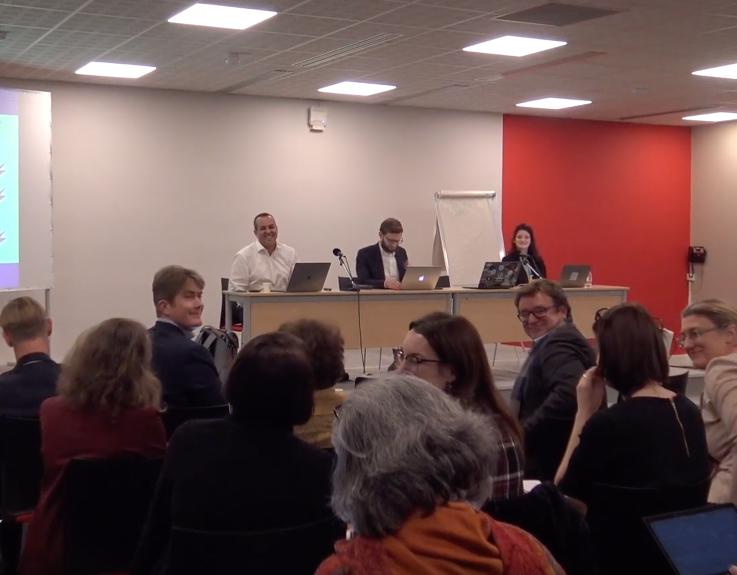
What happened at the European Union Blockchain Observatory & Forum workshop on the Legal Recognition of Blockchains and Smart Contracts in Paris on 12 December, 2018
Published 24 December, 2018
Video from the workshop is available here.
No digital technology is an island unto itself, existing only in the realm of bits and bytes. Quite the contrary, as with any tool our digital technologies are meant to serve human ends. That means they cannot help but intersect with the analog – and very human – world of the law and regulation.
This is certainly the case with blockchain. By enabling new, often decentralised, means for human transactions and agreements, blockchain has the potential to transform or disrupt important social and economic institutions. Not surprisingly, this raises a number of interesting and thorny legal and regulatory issues.
Shedding light on some of these problems was the object of the sixth European Union Blockchain Observatory & Forum workshop, held in Paris on 12 December, 2018. Below we provide highlights of what proved a day of interesting and far-ranging discussion.
Many areas of uncertainty
To begin, participants looked to define the main areas where the intersection of blockchain and the law raised questions. These include:
- Liability: How can we assign liability in this new world of P2P transactions and automated “contracts”?
- Legal recognition of smart contracts: To what extent do smart contracts represent something new in the legal universe, if at all? If they are new, how do we best afford them legal recognition. If they are not new, how do we best incorporate them into existing frameworks?
- Decentralized autonomous organizations (DAOs): To what extent are DAOs a new form of organisation that requires its own legal definition and treatment?
- Legal value of a blockchain-based proof: To what extent does data stored on a blockchain have legally binding status?
- Blockchains and transfer of value: To what extent does blockchain technology allow for the creation of new types of digital assets, if at all? Do we need new categorisations and legal and regulatory treatment of blockchain-based digital assets, or can they be fit into existing frameworks?
For Europe, there is much at stake in clarifying these questions. A solid legal and regulatory framework is the prerequisite for a healthy and value-producing blockchain industry, and an essential prerequisite for entrepreneurs, developers and the blockchain community to innovate. With such a framework, Europe can cement its position as an attractive location for blockchain technology while maintaining robust oversight and safeguards. Absent it, Europe runs the risk of seeing blockchain activity slow down in the region, potentially in favor of other jurisdictions.
The good news is that developing such a framework, while a complex undertaking, would likely not require writing new laws and regulations. Instead, the vast majority of use cases could likely be handled through existing frameworks, though there will be many instances where blockchain-specific clarifications will likely be necessary.
Where existing frameworks should - generally - suffice
The issue of the legal recognition of smart contracts is a good case in point. Despite their name, these are generally not contracts in the legal sense, but rather the expression in code of a business process or agreement between counterparties (usually with the intention of automating the carrying out of the agreement). As such, most participants did not see a need for specific smart contract law or regulation, but rather anticipated that smart contracts could be handled on a case-by-case basis taking into consideration the “off-chain” relationships and situation among the counterparties.
More clarification would likely be needed for digital assets represented by blockchain-based cryptographic tokens. As these can be used in a variety of ways, legal treatment of such assets requires a clear set of token categories. Some authorities, including those in Austria and Switzerland, have proposed three main types that could serve as a good model:
- Payment tokens
- Security tokens
- Utility tokens
Once properly categorised, participants felt, it should be possible to map the tokens to existing financial, currency, consumer or investor protection frameworks. This would not always be straightforward: certain tokens, particularly those with a hybrid function, may need specific clarifications. But it should in most cases be possible, opening the door to widespread use and trading of such assets. Categorisation would also help clear up current uncertainties around the tax and accounting treatment of blockchain-based digital assets, further catalysing use.
Where new frameworks will likely be necessary
Which isn’t to say blockchain has nothing novel to offer. By allowing for instance the automation of much if not all of the governance activities in the form of decentralised autonomous organisations (DAOs), the technology is likely to help in the creation of new types of governing structures for organisations.
To the extent that certain kinds of DAOs represent new organisational forms, there could be a need for a new type of legal personality and with it new legal and regulatory frameworks. Of all the issues around blockchain and the law, this is the one that is probably most obscure at the moment, and likely the subject of intense future debate.
Details
- Publication date
- 24 December 2018
